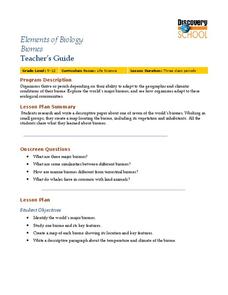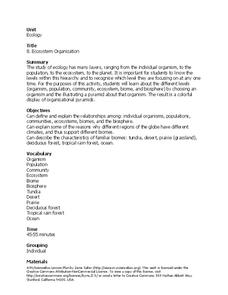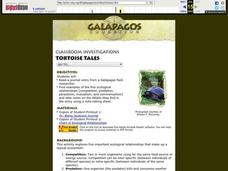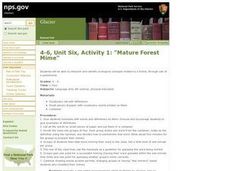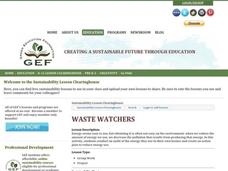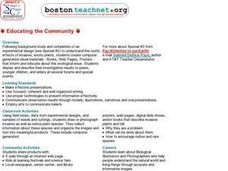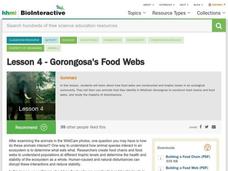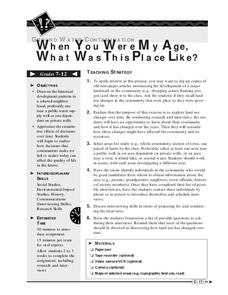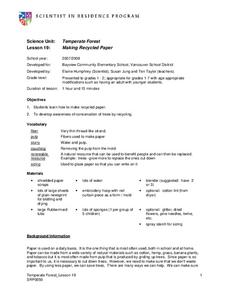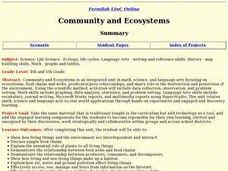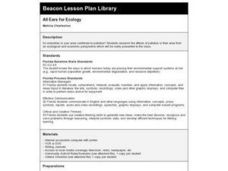Curated OER
Using A Winogradsky Column to Analyze Microbial Communities
Students use easily obtained materials to study ecological succession in a microbiological community. This investigation is appropriate for a variety of age groups. Elementary Students be fascinated by the changes occurring over time...
Curated OER
Biomes
Students explore the worlds biomes and see how organisms adapt to these ecological communities. In this world's biomes instructional activity students research and write a paper about one of the world's biomes.
Curated OER
Ecosystem Organization
Students examine the structure of ecosystems. In this ecology lesson, students listen to a lecture on relationships among organisms and biomes. Students use the information to create ecosystem organization pyramids.
Curated OER
Tortoise Tales
Students read journal entry from a Gal??pagos field researcher, find examples of five ecological relationships (competition, predation, parasitism, mutualism, and commensalism) and take notes on the details they find in the entry using a...
Curated OER
A Coastal Arctic Food Web
High schoolers create a food web of the arctic ecosystem. In this biology lesson, students explain how global warming affects this ecosystem. They explain how losing a species affects the entire community.
Curated OER
Ecological Communities:The Prairie
Students study the meaning of ecological community and recognize its complexity. In this ecology lesson students diagram a food web.
Curated OER
Mature Forest Mime
Learners come to understand vocabulary words through pantomime. For this vocabulary lesson, students first review several vocabulary words and their meaning, then they work in groups to pantomime the definitions.
Curated OER
Waste Watchers
Energy-aware learners conduct an audit on their electricity usage by recording their electric meter reading and assessing the thermostat, light bulbs, windows, and water heaters in their homes. In class, they analyze results and discuss...
Curated OER
Research Projects in Renewable Energy for High School Students
Thirty-eight pages of information prepares you to assign middle or high schoolers a project on sustainable energy. They take a pretest, review the scientific method, conduct background research, and finally choose an experiment to carry...
Curated OER
Presenting Ecology through Rodent Control
Pupils role play the member of a health department task force. In groups, they develop their own recommendations to control the rodent problem in the area. They email their local government official and research information about the...
Curated OER
Educating the Community
Students research the effects of invasive and exotic plants. They create posters, webpages and books to educate the community. They present their material in different forums.
Howard Hughes Medical Institute
Lesson 4: Gorongosa's Food Webs
Who eats who in the savannas of Africa? Explore trophic levels with part four of an eight-part series of lessons focused around Gorongosa National Park. After young explorers identify animals using trailcam images, they construct a food...
Curated OER
When You Were My Age, What Was This Place Like?
Students discover how land use in their community has changed. In this community and ecology lesson, students scan old newspapers to find articles about the development of community land. Students discuss and predict how land use has...
Curated OER
Activity 1: Please Pass the Energy, Food Webs in the Upper Ocean and Hydrothermal Vent Communities
Students create food webs for two different ocean communities. They are given cards showing organisms from the surface of the ocean. They arrange them in order of who eats whom. After this class activity, students create a food web for...
Curated OER
Making Recycled Paper
Young scholars explore paper making. In this tree conservation ecology lesson, students brainstorm ways paper is used in daily life. Young scholars examine paper fiber using a magnifying glass. Students make paper following a step by...
Curated OER
The Changing Coral Reef Community Game
Students examine organisms that inhabit the coral reefs and their living requirements. In this coral reef lesson students chart population changes and play a game.
Curated OER
Community and Ecosystems
Students complete a unit of lessons on ecosystems. They participate in online activities, create a diorama, write journal entries, and develop a Hyperstudio multimedia project on a selected ecosystem.
Curated OER
All Ears for Ecology
Fourth graders research to see the effects that air pollution has on where they live. They explore improper dumping of waste run-off, air pollution, and water pollution.
Curated OER
Turning the Tide on Trash: Marine Debris Curriculum
Seven pages of fascinating reading on marine debris preface the activities in this lesson plan. Four different activities are employed to simulate how the debris is distributed in the ocean and along beaches. Early ecology learners...
Illinois Department of Natural Resources
Section Two: Why is Biodiversity Important?
Explore soil, genetic traits, natural resources, and pollution in a series of lessons that focus on biodiversity. Kids complete experiments to learn more about the importance of varied genes and organisms in an ecosystem.
Curated OER
Teaching Kids about the Environment
Fifth graders identify the species of plants and animals found in an environment. They compare these findings to plant and animal species found in an unlike environment. Students acquire and compare soil samples from the two sites chosen.
Curated OER
What Happened to Robin?
Students investigate animal injuries caused by humans. They present their findings to various neighborhood groups.
Curated OER
The New Haven Oyster Industry and Water Quality
Students examine the different types of water pollutants and how they affect the waterways. In this environmental science lesson, students collect and interpret data from government agencies. They discuss how industrial development in...
Curated OER
Performance Art and The Waste Stream
Students research local waste management services, discuss findings, give opinions about what they have found, offer solutions and ideas, and create performance art, design art works, and fine art works to convey information on waste...

